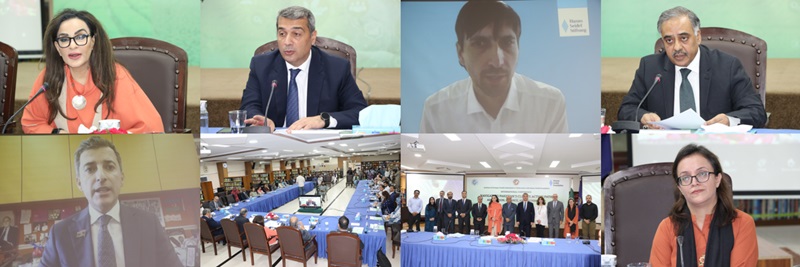Islamabad, Sep 26: The Centre for Strategic Perspective (CSP) at the Institute of Strategic Studies Islamabad (ISSI), in collaboration with the Hanns Seidel Foundation (HSF), convened a highly anticipated international conference today, titled “Navigating Pakistan’s Climate Action Path: Adaptation, Finance, and Technology.” The conference, organized ahead of the COP29 summit, brought together leading experts from Pakistan and abroad to deliberate on the country’s climate strategy, focusing on key areas like adaptation, climate finance, and technological advancements. At the Inaugural Session, Senator Sherry Rehman was the Chief Guest.
H.E. Khazar Farhadov, Ambassador of Azerbaijan to Pakistan, emphasized the urgent need for global unity in tackling climate change during his keynote address. He highlighted Azerbaijan’s commitment to promoting peace, climate finance, and adaptation efforts at COP29, stressing that international cooperation is essential for achieving a sustainable and prosperous future for all.
Senator Sherry Rehman, speaking as the Chief Guest, emphasized the urgency of bold climate action at the upcoming COP, referencing the encouraging statements made by the Ambassador of Azerbaijan on renewable energy and financing. She highlighted Pakistan’s unique climate challenges, which are both local and global, emphasizing that no country can face these crises in isolation.
As a developing country on the frontlines of climate change, Pakistan is experiencing increasingly extreme weather events, including successive record-breaking summers over the last four years. Senator Rehman stressed that Pakistan’s economy, natural resources, and people are all at risk, yet the country remains underprepared for an unpredictable future.
Senator Rehman pointed out that while global discussions, such as the Summit of the Future, aimed to set ambitious climate goals, they often fell short of the necessary commitments. Pakistan, having led the G77 during COP27, continues to advocate for developing countries to unite on a common agenda. However, she warned that the clock is ticking faster for vulnerable nations like Pakistan, with this decade being crucial for achieving climate targets not the distant 2050.
Senator Sherry Rehman also called for improved climate reporting, noting that many developing countries lack the capacity to measure emissions accurately. She criticized the slow pace of climate finance and underscored the vital importance of accelerated operationalization and increased capitalization of the Loss and Damage Fund. She also stressed that global north-south financial transfers must accelerate, underlining the need for focusing on ‘Internationally Determined Contributions’ as well.
Lastly, Senator Rehman underscored the need for enhanced citizen involvement and local climate action, urging Pakistan to strengthen its environmental protection agencies. Climate justice, she emphasized, must be at the forefront of global discussions, ensuring no country or community is left behind. She stressed that Pakistan should play a leadership role in this regard.
In his remarks on the occasion, DG ISSI, Ambassador Sohail Mahmood, welcomed the participants and highlighted the critical importance of these dialogues in shaping Pakistan’s climate strategies. He expressed gratitude to HSF for its partnership and acknowledged the distinguished speakers, including government officials, civil society representatives, and international experts, for their contributions. He recognized Senator Sherry Rehman for her relentless advocacy for climate justice and her leadership role in securing a global outcome on the creation of the Loss and Damage Fund at COP27 at Sharm-el-Sheikh in 2022.
He emphasized Pakistan’s vulnerability to climate change, despite contributing less than 1% to global emissions, referencing the devastating 2022 floods and the urgent need for adaptation measures. Pakistan’s leadership at COP27, particularly in the creation of the Loss and Damage Fund, was a pivotal moment for climate-vulnerable nations. Looking ahead to COP29, Ambassador Mahmood stressed the importance of securing additional climate finance from developed countries and ensuring greater transparency. He also underscored Pakistan’s commitment to a renewable energy transition, while balancing energy security for developing nations.
Dr. Neelum Nigar, Director CSP, in her introductory remarks emphasized Pakistan’s urgent climate challenges, highlighting the need for investment in green technologies, climate finance, and adaptation measures to build resilience and promote sustainable development.
Mr. Stefan Burkhardt, Head of Division HSF Asia, highlighted the global climate crisis, emphasizing the need for accelerated action following COP27 and COP28. He praised the establishment of the Loss and Damage Fund at COP27 but stressed the importance of effective implementation, particularly for vulnerable countries like Pakistan. He urged Pakistan to strengthen its climate action strategy to access resources and attract international climate finance. Mr. Burkhardt also noted the severe impact of climate change on Pakistan’s economy and its critical role in global climate efforts.
Dr. Fariz Ismailzade, Vice Rector at ADA University in Baku and member of the Azerbaijan Parliamment praised ISSI for fostering Pakistan-Azerbaijan relations and highlighted ADA’s leadership in uniting experts for COP29 climate change discussions in Baku.
The Inaugural Session concluded with Ambassador Khalid Mahmood, Chairman Board of Governors ISSI, presenting shields to the Chief Guest and Keynote speaker, followed by a group photograph.
